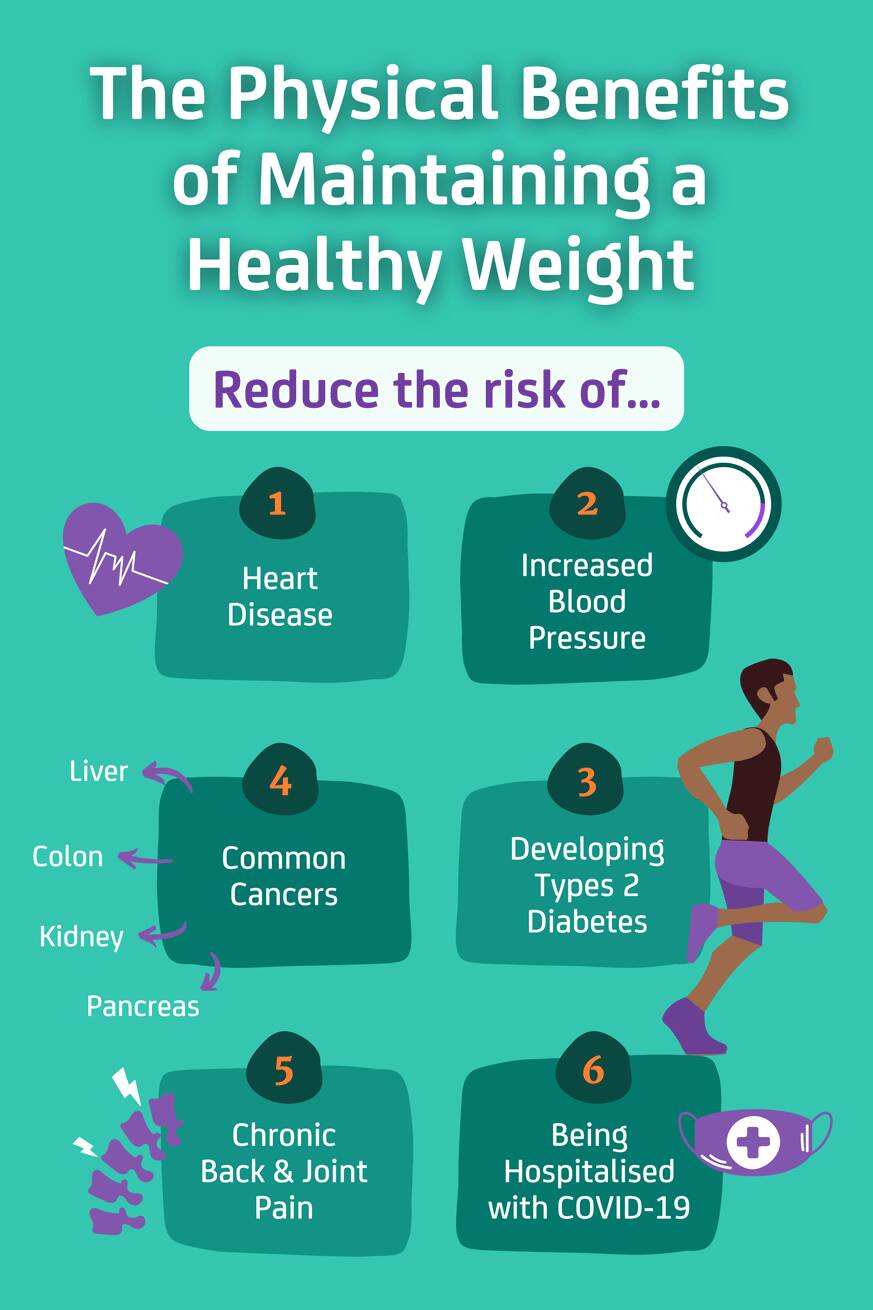
The benefits of losing weight that receive the most attention are often cosmetic in nature, like visible abs or a pronounced jawline. But what about the skin-deep benefits of weight loss? What are the benefits of maintaining a healthy weight for our organs, joints, and reproductive system?
With the number of overweight and obese adults in the country increasing by 12% and 14% respectively over the last three decades,[1] it’s more important than ever to understand the physical benefits of weight loss and how weight loss medication and treatments factor into the equation.
This is why our experts have put together this guide on how weight loss benefits vital physiological functions, such as movement, breathing, reproduction, and more.

Organ health benefits of weight loss
Heart
One of the primary benefits of losing weight is a reduced risk of cardiovascular diseases. According to the NHS,[2] being overweight increases the likelihood of blood vessels becoming clogged due to high cholesterol levels in the body. Moreover, excess body weight can squeeze the arteries, resulting in high blood pressure from the heart having to pump harder and faster than usual.
Losing weight benefits heart health because it results in a lower blood cholesterol level and reduces the extent to which blood vessels become constricted due to excess body weight. Our experts recommend moderating your intake of high-cholesterol foods such as beef, cheese, and eggs to maximise the cardiovascular benefits of losing weight.
Brain
Some studies suggest that fat cells accumulated by the body due to weight gain can cause a spike in the body’s levels of interleukin-1 (a group of cytokines that can cause systemic inflammation in all parts of the body[3]).
If the brain becomes inflamed due to an increase in interleukin-1 levels, various cognitive and behavioural symptoms may ensue such as shortfalls in memory. Weight control benefits the brain by reducing the body’s levels of interleukin-1, resulting in potential improvements in memory, attention, executive functions, linguistic abilities, and motor speed.
Liver
It is commonly assumed that reducing alcohol consumption is sufficient to protect the liver. However, some research suggests that in addition to drinking less alcohol, it is also important to consider reducing the amount of fat around the liver to prevent fatty liver disease - a condition that impedes the body’s ability to produce bile for digestion and store iron for proper blood oxygenation.
Maintaining a healthy weight benefits the liver because it eliminates harmful fat deposits. Our experts recommend losing weight by eating a balanced portion of fats (approximately 20% of your daily caloric intake[4]) and exercising regularly to prevent fatty liver disease.
Lungs
Weight management benefits your lungs in two key ways. Firstly, losing weight can reduce the amount of pressure placed on the chest and diaphragm. This makes it easier to breathe and reduces the risk of respiratory issues such as asthma and sleep apnea.
Secondly, losing weight can result in improved lung capacity and function if it is achieved through aerobic exercises such as cycling and running. These exercises cause the lungs to be flooded with blood, increasing the ability of the lungs to extract oxygen from the air.[5]
Kidney
We touched on the link between losing weight and blood pressure when discussing the heart earlier, but did you know this link extends to kidney health as well?
High blood pressure is a leading cause of chronic kidney disease (CKD) - a condition that can prevent the kidneys from adequately filtering waste from the blood. Weight loss can prevent high blood pressure, making CKD less likely and preventing the need for dialysis or a transplant in the future.
Colon
Being overweight or obese can affect how the colon functions, resulting in conditions such as inflammation. Losing weight can prevent these conditions from intensifying.
Colon inflammation may result in a polyp or tumour if left untreated, which is why our experts recommend getting to a safe BMI range and staying there before colon health complications from being overweight arise.
Pancreas
The primary function of the pancreas is to produce enough insulin to metabolise blood glucose. Being overweight can hinder the pancreas’ ability to produce enough insulin to regulate blood sugar levels, potentially leading to type 2 diabetes.
Losing weight benefits the body by improving insulin sensitivity and glucose metabolism - both of which can prevent and reverse pancreatic damage.
Joint and mobility benefits of losing weight
Reducing weight benefits the joints because the more weight the body is required to carry around, the more strain is put on the back, hips, and knees.
While it isn’t possible to regrow worn cartilage in these areas, further damage may be prevented by reaching and staying at a healthy weight.
Here are our experts’ responses to three of the most frequently asked questions regarding weight loss and joint pain.
What’s a healthy weight for preventing joint pain?
There is no ‘healthiest’ weight for preventing joint pain. Whether or not a person is at a suitable weight to prevent joint pain depends on the current state of their joints.
For example, 80kg may be the ideal weight for someone with zero joint cartilage damage - whereas it might be too high for someone with damaged knees.
What is an ideal weight loss exercise for those with joint pain?
It depends on the mobility issue. If the joint pain doesn’t affect the hips or knees, walking and light running are exercises worth considering for weight loss.
On the other hand, if a person has extensive mobility issues, swimming is a suitable alternative because it doesn’t impact the joints as much as running.
For more information on the merits of exercises like swimming and running for weight loss, check out our guide on everything you need to know about weight loss.
Do you get joint pain after weight loss?
According to limited research,[6] joint pain after weight loss may be experienced by people with joint hypermobility - a condition characterised by an unusually large range of movement in some or all joints. It is also possible to get joint pain if weight is lost through exercises that strain the joints such as sprinting, climbing, and squatting.
Our experts recommend exercises that are easy on the joints, such as cycling and swimming.
Sexual health benefits of being a healthy weight
For Women
Some studies have linked weight loss to an improvement in female sexual functions such as arousal.[7] For example, a recent study found that reducing body weight by 2% to 5% can result in improvements across multiple female sexual functions.[8]
Moreover, another study found that weight loss can improve sexual health in women who have gestational diabetes, polycystic ovary syndrome (POCS), pelvic organ prolapse, or urinary incontinence.[9]
This shows that maintaining a normal healthy weight can help women with improving their sexual health.
For Men
Research shows that the accumulation of visceral fat can result in erectile dysfunction (ED) in men aged 60 and above.[10] There is also evidence to suggest that losing weight results in an increase in adiponectin circulation among obese men - a hormone that regulates blood glucose levels and is directly correlated with ED.[11], [12]
We recommend thinking of weight loss as a way to improve overall health as opposed to just sexual health. This is particularly important for obese and overweight men.
Lose weight quickly and sustainably using proven treatments
At Pharmica, we’ve earned a reputation for being one of the UK’s leading online pharmacies by providing clinically proven weight loss treatments with a range of convenient and discreet delivery options.
We conduct online consultations for weight loss treatments to ensure patient safety and provide reliable, evidence-based health and lifestyle advice for weight loss through our Health Center Blog.
Having earned a 4.9 out of 5 rating from more than 160,000 reviews and with over a million patients served to date, we’re proudly leading the way in transforming the online pharmacy experience through cutting-edge features and solutions.
Explore our full range of treatments today.